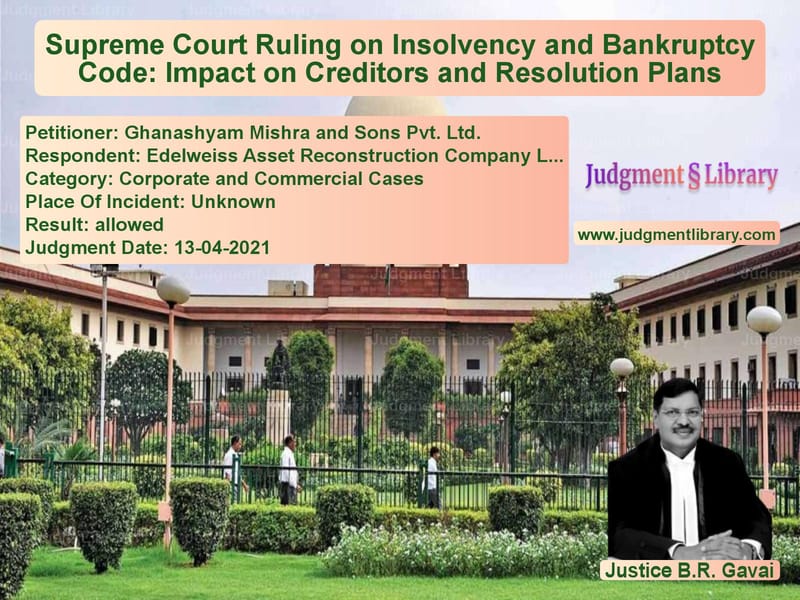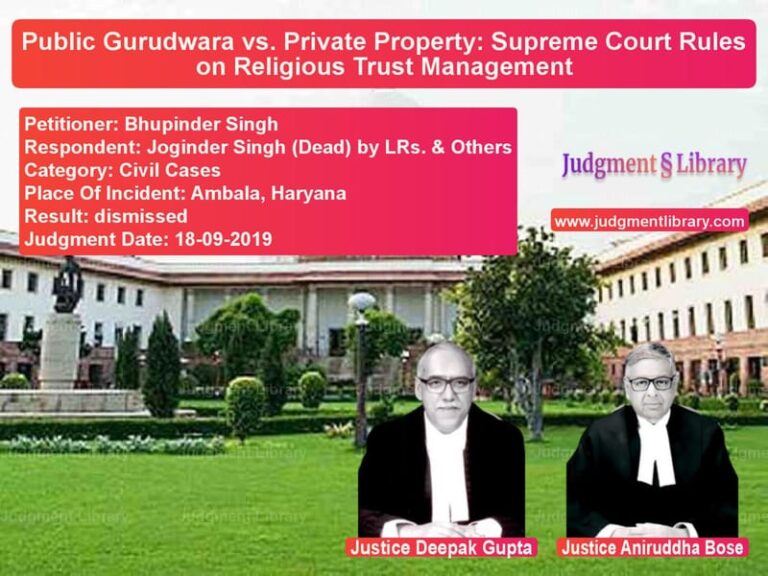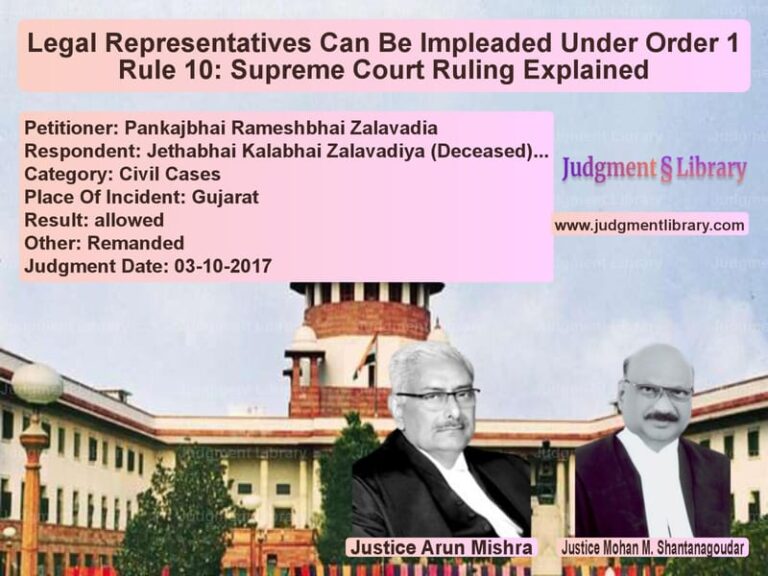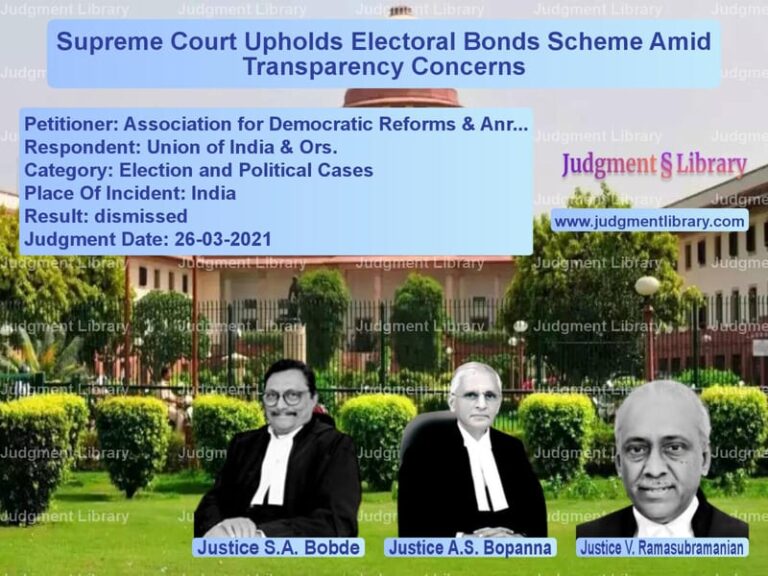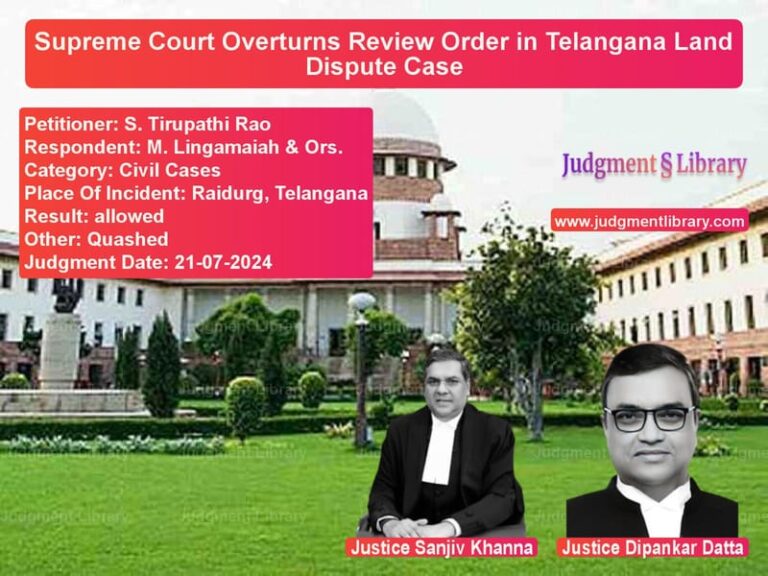Supreme Court Ruling on Insolvency and Bankruptcy Code: Impact on Creditors and Resolution Plans
The Supreme Court of India recently delivered a landmark ruling in Ghanashyam Mishra and Sons Pvt. Ltd. v. Edelweiss Asset Reconstruction Company Ltd., which significantly impacts the application of the Insolvency and Bankruptcy Code, 2016 (IBC). The judgment clarifies the rights of creditors, the enforceability of resolution plans, and the extent to which government dues can be recovered post-approval of a resolution plan.
Background of the Case
The case involved a dispute over whether statutory dues owed to the government and other creditors could be claimed from a corporate debtor after a resolution plan had been approved by the National Company Law Tribunal (NCLT). The appellant, Ghanashyam Mishra and Sons Pvt. Ltd., contended that once a resolution plan was approved, all claims, including those of the government, should be extinguished.
The issue arose in the context of the insolvency proceedings initiated against Orissa Manganese & Minerals Limited (OMML), which was undergoing a Corporate Insolvency Resolution Process (CIRP). The NCLT approved a resolution plan submitted by the appellant. However, certain government authorities and other creditors sought to recover their statutory dues despite the approved resolution plan.
Petitioner’s Arguments (Ghanashyam Mishra and Sons Pvt. Ltd.)
- The petitioner argued that once a resolution plan is approved under Section 31 of the IBC, all prior claims against the corporate debtor, including statutory dues, should be deemed extinguished.
- The petitioner contended that the amendment to Section 31 of the IBC, introduced in 2019, clarified that all stakeholders, including government authorities, must abide by the approved resolution plan.
- The petitioner relied on past Supreme Court judgments that emphasized the finality of a resolution plan once approved by the NCLT.
- The petitioner submitted that allowing post-approval claims would defeat the purpose of the IBC, which aims to provide a clean slate to the resolution applicant.
Respondent’s Arguments (Edelweiss Asset Reconstruction Company Ltd. and Government Authorities)
- The respondents argued that statutory dues owed to the government should not be extinguished merely because of a resolution plan approval.
- The respondents contended that the government, as a sovereign entity, has special rights in the recovery of dues, which cannot be overridden by an IBC resolution.
- The respondents submitted that certain dues were not explicitly covered under the resolution plan and, therefore, should still be recoverable.
- They also relied on the principle that statutory obligations must be honored even if a corporate debtor undergoes insolvency.
Supreme Court’s Analysis and Judgment
The Supreme Court conducted an extensive analysis of the IBC framework, its objectives, and the role of statutory dues within insolvency proceedings. The Court observed that:
- “Once a resolution plan is approved under Section 31(1) of the IBC, it is binding on all stakeholders, including the Central and State Governments.”
- “The intent of the IBC is to ensure the revival of the corporate debtor and provide a fresh start to the resolution applicant without any past liabilities.”
- “The amendment to Section 31, introduced by the Insolvency and Bankruptcy Code (Amendment) Act, 2019, is clarificatory and, therefore, applies retrospectively.”
- “Any claims that were not part of the resolution plan cannot be enforced against the corporate debtor post-approval.”
The Court ruled in favor of the petitioner and held that all claims, including statutory dues, stand extinguished upon approval of a resolution plan. It reaffirmed that the IBC aims to ensure certainty and finality in the insolvency resolution process.
Key Takeaways from the Judgment
- This ruling strengthens the position of resolution applicants by providing legal certainty that no further claims can be raised post-approval.
- Government authorities and other creditors must ensure that all claims are accounted for within the resolution process and cannot demand dues post-resolution.
- The decision reinforces the IBC’s objective of enabling the revival of distressed businesses by providing a clean slate.
Impact on Corporate Insolvency Proceedings
The Supreme Court’s ruling has significant implications for future insolvency proceedings:
- For Resolution Applicants: It provides confidence to investors and resolution applicants that they will not face unexpected liabilities after acquiring a distressed company.
- For Creditors: Creditors, including government authorities, must be diligent in submitting their claims within the CIRP framework.
- For Government Authorities: The ruling clarifies that statutory dues must be included within the resolution process and cannot be recovered separately post-approval.
Conclusion
The Supreme Court’s judgment in Ghanashyam Mishra and Sons Pvt. Ltd. v. Edelweiss Asset Reconstruction Company Ltd. is a landmark ruling that reinforces the objectives of the IBC. By affirming the finality of resolution plans and extinguishing post-approval claims, the Court has strengthened India’s insolvency framework.
The ruling is expected to have far-reaching consequences in corporate restructuring and insolvency cases, providing greater certainty to resolution applicants and promoting investor confidence in India’s insolvency resolution system.
Petitioner Name: Ghanashyam Mishra and Sons Pvt. Ltd..Respondent Name: Edelweiss Asset Reconstruction Company Ltd..Judgment By: Justice B.R. Gavai.Place Of Incident: Unknown.Judgment Date: 13-04-2021.
Don’t miss out on the full details! Download the complete judgment in PDF format below and gain valuable insights instantly!
Download Judgment: ghanashyam-mishra-an-vs-edelweiss-asset-reco-supreme-court-of-india-judgment-dated-13-04-2021.pdf
Directly Download Judgment: Directly download this Judgment
See all petitions in Bankruptcy and Insolvency
See all petitions in Corporate Compliance
See all petitions in unfair trade practices
See all petitions in Judgment by B R Gavai
See all petitions in allowed
See all petitions in supreme court of India judgments April 2021
See all petitions in 2021 judgments
See all posts in Corporate and Commercial Cases Category
See all allowed petitions in Corporate and Commercial Cases Category
See all Dismissed petitions in Corporate and Commercial Cases Category
See all partially allowed petitions in Corporate and Commercial Cases Category

